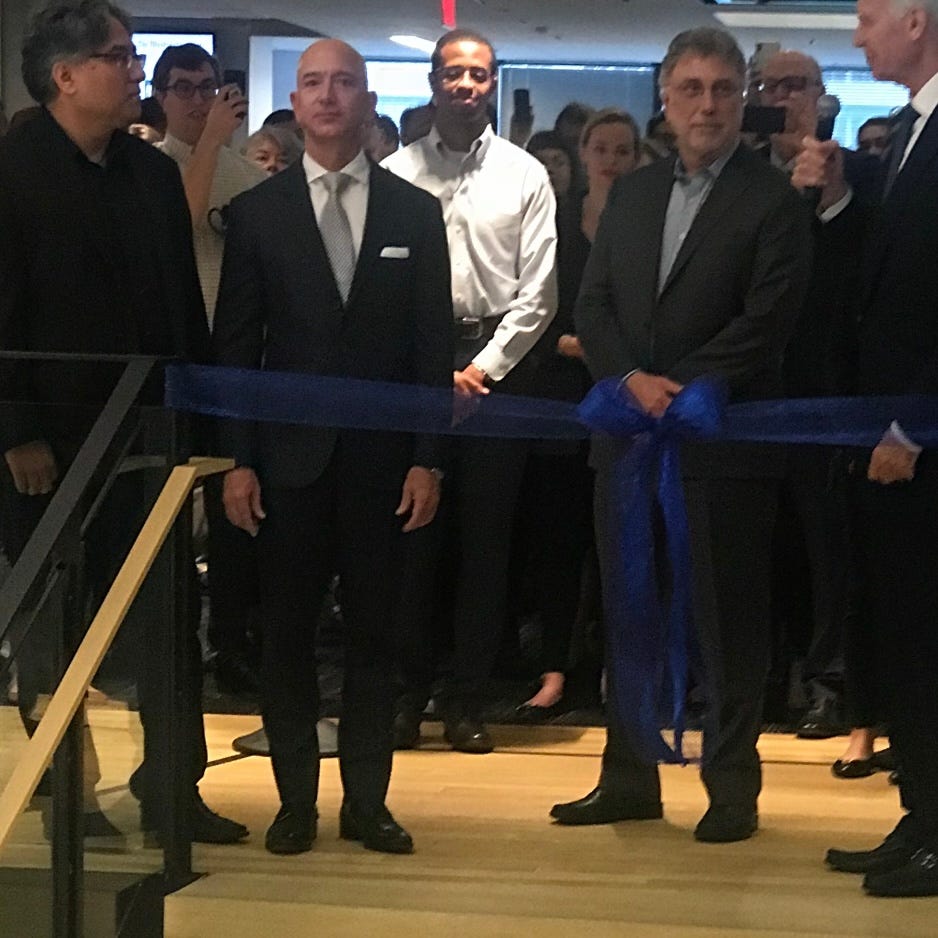Bezos should sell The Washington Post, but not to another billionaire
You can't stop a bad billionaire with a good billionaire, because there aren't any.
The Washington Post newsroom was already struggling through its most turbulent years before Jeff Bezos interfered last Friday. There was a layoff, a long and bitter contract negotiation, a strike, a buyout shedding 10 percent of its staff (including me), the sudden resignation of its executive editor and the inherited scandals of its new idiot publisher.
Then Bezos singlehandedly — and apparently against advice — delivered what could quite possibly be a death blow, violating the newsroom’s independence and killing an already written editorial. A stunning 250,000 subscribers have cancelled, with more surely to come.
I was in the newsroom the day Don Graham announced he had sold The Post to Bezos in 2013. People were terrified — not just for their jobs but for journalism, for freedom of speech and of the press.1 Would the paper become a vessel for Amazon product placement? Would Bezos kill negative stories about him, or assign stories about his competitors? Graham assured us Bezos had earned his complete trust, and was willing to earn ours. The new owner “believed in the mission” and would not interfere in the day-to-day newsroom, we were assured.
Over the years, that seemed to prove true. Billionaire ownership looked like a ton of new hires, a snazzy newsroom upgrade, encouragement to be ambitious and a return to profitability. Every once in while we’d have to grimace through his cheesy cosplaying — calling us swashbuckling badasses, cutting a ribbon for a new staircase, appending his dramatic slogan to the masthead. But it didn’t mean any changes to our journalism, except that we got to do more of it.
Once, Bezos broke big news — he’d been the target of an extortion attempt — and published it on Medium.com. Not in our opinion section, and not as an exclusive for one of our reporters to write up. It was a great move, because it meant the separation between him and the newsroom was sound.
Occasionally we’d hear that his ownership wasn’t charity, he expected us to be profitable, and some of us would wonder, Why not do it for charity though? God knows you can afford it. But no matter, we were profitable then, thanks in large part to the “runway” he provided. Right?
It’s clear now that at least some of this era was a mansion built on jello. We’ll never know how much, because Bezos sent off our last publisher with a golden parachute “civility institute,” and our interim publisher, when asked about what happened that we were suddenly $77 million in the hole, insisted we “shouldn’t focus on the past.”2 The new publisher seems to have been hired because of his history doing Rupert Murdoch’s bidding, not in spite of it.
For the record, I think all editorial boards should be abolished. They are confusing for readers,3 and, as an anonymous voice on high, often ascribe more authority to their writers than is deserved — creating mistrust on one end and impunity on the other.
But that’s not the problem here. The problem is an owner, previously avowed to not interfere, interfering. Without warning, against advice, and on only one matter — a matter in which he is clearly compromised. Even setting aside the “complexifiers” of his other companies’ federal contracts, only one of the presidential candidates wants to raise taxes on billionaires: the candidate whose endorsement he killed.
Marty Baron — who knows Bezos well, was no friend of the opinion section, and as far as I can tell has never expressed a political view in his life — called Bezos’s interference “cowardice, with democracy as its casualty.”
At least one of my former colleagues — a thoughtful and generous man, in my experience — has suggested this interference is forgivable if it’s just a one-off and not “the beginning of a crackdown on journalistic integrity.” I disagree. I am floored by the disrespect of enforcing a policy change on a piece that was already written, and by the dishonesty of his lackey publisher pretending it was his own decision.
It matters not at all that Bezos claims to have been thinking about doing it for awhile if he didn’t share that with the people it would affect. The disrespect and dishonesty are ongoing for as long as these men don’t acknowledge it.
Yes, cancelling subscriptions could hurt Post employees more than it hurts Bezos. But it sure can annoy him, and at this point I think annoying him so much he sells the damn thing might be the only path to restore readers’ trust in The Post. Go off to your yachts and your rockets and the billionaire island you share with Jared and Ivanka, sir! You don’t need this headache from all these ungrateful plebes!
Let’s be clear: Another billionaire is not the answer. If the bizarre, shady, immoral behavior of Bezos, Elon Musk, Patrick Soon-Shiong, and Mark Zuckerberg4 just in past week proves anything, it’s that they are all compromised. That’s how they became billionaires.
Yes, even Mark Cuban. And while I think “unbiased” is a false construct, I still believe in journalistic independence, and an owner as closely associated with one political party as Cuban is not the way to go.
I strongly support the worker-owned media outlets cropping up in the last few years, but I suspect The Post is simply too expensive to convey to this model; Bezos got it at a steep discount 11 years ago for $250 million. It is worth more now, and we all know he’s not into charity. He’s not going to just give it away.
Then there’s the nonprofit model like ProPublica, which does incredible accountability work. Its vulnerability to meddling from rich donors is lessened (though not eliminated), and there is still the problem of how it conveys. The largest newspaper to go nonprofit is the Chicago Sun-Times, which merged with Chicago Public Media in 2022 using $60 million from philanthropic groups. Purchasing The Post would take a lot more than that. I supposed it’s possible to find a billionaire to buy it and pinky-promise to turn it into a nonprofit, but given our experience with billionaires changing their minds on the whole integrity thing, I think it’s risky.
Here’s what I think is most promising: The creation of a nonprofit organization to which a coalition of the least-horrible rich people — the Graham family and Mackenzie Scott come to mind, but there are others — donate the money needed so that the nonprofit can purchase The Post, which would remain for-profit. It would probably be a tax write-off for them (I don’t know, that’s why they have lawyers), and would create a layer of protection so that none of them could takeover the newspaper. The nonprofit could provide targeted support to The Post when needed and would have a vote on The Post’s board of directors but would otherwise be independent. Oh yeah, and a board including the publisher, distinguished journalists and community members would make business and strategy decisions — not one man by fiat.
It isn’t that crazy. This is how the Philadelphia Inquirer has operated since 2016. After a decade in a bankruptcy-sale-layoff-lawsuit death spiral, it was purchased at a pittance by Gerry Lenfest — a naval officer who rode the cable TV wave in 1980s and 90s. He spent his remaining years — he died in 2018 — giving his billion-dollar fortune away.5 One of his last acts was acquiring sole ownership of the Inquirer and donating it to the newly created Lenfest Institute for Journalism, which also gives gives grants and training to smaller media groups.
Things are still hard for the Inquirer — the newsroom and circulation remain a fraction of what they once were — but it seems at least the bleeding has stopped. And there signs of hope, like bold, clear-eyed editorial decisions (swashbuckling, one might say) and a spike in subscriptions this summer. (I suspect subscriptions will go up even more, as many have switched from The Post to the Inquirer in the past week.)
I do not have a detailed plan, and I may not be explaining this precisely right — I stopped thinking about business and finance as soon as I finished my business journalism master’s degree (thanks for the scholarship, Michael Bloomberg, I hope that looked good on your taxes). Any flaws on that end do not disqualify the merit of the idea.
Imagine with me, a better world, where The Post makes a bold ownership move that restores, strengthens and maintains the public trust. Before the fifth round of layoffs. Before the pay cuts. Before it gets hacked to pieces and digested by an Axel Springer or a tronc. Before pop-up ads pollute the site like chickenpox and “articles” are “written” by AI.
A couple weeks ago, I attended the annual Democracy Summit at Howard University’s Center for Journalism and Democracy. I went to the first one in 2022, held in a campus ballroom packed with journalists — many friends, some heroes, and some excellent student journalists from HBCUs across the country. This year was quieter, the ballroom a little over half full and comprising mostly students. I was surprised at first — I hope it was just because of the election? — but was soon as engrossed and inspired as ever by the conference’s speakers, starting with the Center’s founder, Nikole Hannah-Jones.
There is no free press without democracy, she said, so journalists should and must openly advocate for it. Whatever qualms we may or may not have about “bias,” we should not be neutral about democracy.
This year’s conference theme? Oligarchy.
I wish more of my colleagues in billionaire-owned media had been there to hear it.
Yes, we journalists take ourselves far too seriously. I’m working on it.
I am literally a journalist who writes about history.
If you’ve frustratedly explained to people for the millionth time that the editorial board is in the opinions section, which is separate from the editorial section and not the same as the senior editors or the board of the company, maybe it’s actually the system that should change and not the readers?
I’m not including Donald Trump because I don’t believe he’s billionaire.
Would that more rich people would do this — it seems really fun!





